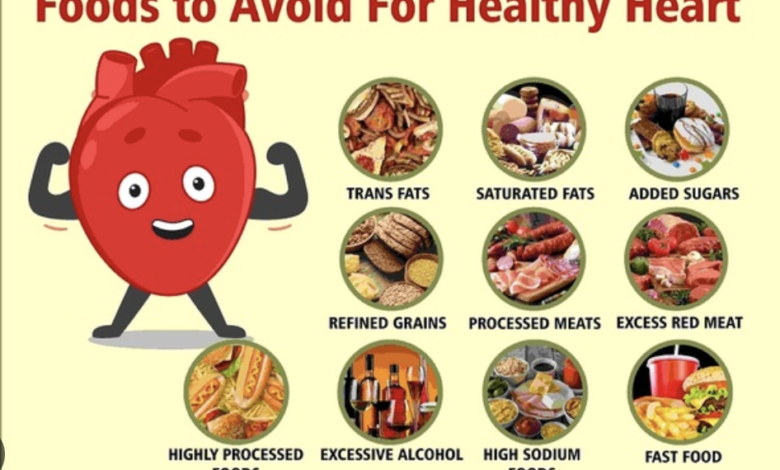
Maintaining a healthy heart is crucial for overall well-being, and one of the primary factors that contribute to heart disease is the consumption of unhealthy fats. Understanding the different types of fats and their effects on heart health can help individuals make informed dietary choices and protect their cardiovascular system. This article explores the unhealthy fat that should be avoided for a healthier heart, the dangers it poses, and tips for reducing its intake.

Understanding the Different Types of Fats
Not all fats are created equal, and it is essential to distinguish between the healthy and unhealthy fats. Saturated fats and trans fats fall under the category of unhealthy fats, while unsaturated fats, including monounsaturated and polyunsaturated fats, are considered healthier options.
Saturated fats are primarily found in animal products such as meat, cheese, and butter. Although they are crucial for the body in moderation, excessive consumption can raise cholesterol levels and increase the risk of heart disease. Trans fats, on the other hand, are artificially produced through a process called hydrogenation. They are commonly found in processed foods, fried snacks, and baked goods. Trans fats have been linked to inflammation, insulin resistance, and an increased risk of heart disease.
The Unhealthy Fat to Avoid for a Healthier Heart
Among the different types of unhealthy fats, trans fats are the ones that should be strictly avoided for a healthier heart. Trans fats are created by adding hydrogen to liquid vegetable oils, which increases their shelf life and enhances flavor stability. However, this process also makes them extremely harmful to the cardiovascular system.
Trans fats have been shown to raise levels of LDL (low-density lipoprotein) cholesterol, commonly known as “bad” cholesterol, while lowering levels of HDL (high-density lipoprotein) cholesterol, the “good” cholesterol that helps remove harmful cholesterol from the bloodstream. This imbalance can lead to the accumulation of plaque in the arteries, increasing the risk of heart disease, heart attacks, and strokes.
The Dangers of Consuming This Type of Fat
Consuming trans fats can have severe consequences for heart health. Research has consistently demonstrated the negative impact of trans fats on cholesterol levels and the overall cardiovascular system. These dangerous fats not only raise LDL cholesterol but also reduce the body’s ability to remove it effectively. This double whammy significantly increases the risk of atherosclerosis, a condition characterized by the buildup of plaque in the arteries.
Moreover, trans fats promote inflammation within the body, leading to further damage to the arteries and increasing the likelihood of blood clots. Inflammation has been linked to various chronic diseases, including heart disease, diabetes, and certain cancers. By avoiding trans fats, individuals can significantly reduce their risk of developing these conditions and improve their overall heart health.
Foods High in Unhealthy Fats to Watch Out For
To reduce the intake of unhealthy fats, it is crucial to be aware of the foods that are high in trans fats. Processed snacks, such as potato chips, cookies, and crackers, often contain significant amounts of trans fats. Fast food, particularly fried items like French fries and chicken nuggets, is another common source of unhealthy fats. Baked goods, including pastries, doughnuts, and cakes, also frequently contain trans fats.
Additionally, certain margarines, vegetable shortening, and commercially prepared frosting and creamers contain trans fats. It is important to carefully read food labels and look for ingredients such as “partially hydrogenated oil” to identify products containing trans fats. By being mindful of these high-risk foods, individuals can make healthier choices and protect their heart health.
Tips for Reducing Your Intake of Unhealthy Fats
Reducing the intake of unhealthy fats is a key step towards a healthier heart. Here are some practical tips to help individuals achieve this goal:
- Choose lean cuts of meat and trim any visible fat before cooking.
- Opt for low-fat dairy products or alternatives such as almond milk or soy milk.
- Cook meals at home using healthier cooking methods like grilling, baking, or steaming instead of frying.
- Incorporate more plant-based protein sources like legumes, beans, and tofu into your diet.
- Replace butter with healthier options like olive oil or avocado oil for cooking and baking.
- Snack on fresh fruits, vegetables, and nuts instead of processed snacks.
- Read food labels carefully and avoid products that contain trans fats or hydrogenated oils.
- Moderation is key – enjoy your favorite indulgences occasionally but in smaller portions.
By implementing these simple yet effective tips, individuals can make significant improvements to their heart health and reduce their risk of heart disease.
Healthier Alternatives to Replace Unhealthy Fats
Instead of consuming unhealthy fats, individuals can opt for healthier alternatives that promote heart health. Monounsaturated fats, found in foods such as avocados, nuts, and olive oil, are excellent replacements for unhealthy fats. These fats have been shown to improve cholesterol levels and provide essential nutrients for the body.
Polyunsaturated fats, found in fatty fish like salmon, mackerel, and sardines, as well as in walnuts and flaxseeds, are another heart-healthy choice. These fats are rich in omega-3 fatty acids, which have been proven to reduce inflammation, lower blood pressure, and decrease the risk of heart disease.
By incorporating these healthier fats into the diet, individuals can enjoy delicious meals while promoting their heart health. It is important to remember that moderation is still key, as these healthier fats are still calorie-dense.
The Importance of a Heart-Healthy Diet
Maintaining a heart-healthy diet goes beyond avoiding unhealthy fats. A well-balanced diet should include a variety of fruits, vegetables, whole grains, lean proteins, and healthy fats. By consuming nutrient-dense foods, individuals can provide their bodies with the essential vitamins, minerals, and antioxidants needed for optimal heart health.
In addition to a heart-healthy diet, regular physical activity is crucial for maintaining a healthy heart. Engaging in exercises that elevate the heart rate, such as brisk walking, swimming, or cycling, helps strengthen the heart and improve cardiovascular fitness. Combining a balanced diet with regular exercise is a powerful combination for a healthier heart.
Other Lifestyle Changes for a Healthier Heart
In addition to dietary modifications, certain lifestyle changes can significantly contribute to a healthier heart. Quitting smoking is one of the most impactful steps individuals can take to reduce the risk of heart disease. Smoking damages blood vessels, increases blood pressure, and raises the risk of blood clots, making it a major contributor to heart problems.
Managing stress levels is equally important for heart health. Chronic stress can lead to increased blood pressure, inflammation, and unhealthy coping mechanisms such as overeating or excessive alcohol consumption. Engaging in stress-reducing activities like meditation, yoga, or hobbies can help individuals maintain a healthier heart.
Conclusion and Final Thoughts
For a healthier heart, it is crucial to avoid consuming unhealthy fats, particularly trans fats. These fats have been shown to increase the risk of heart disease, raise LDL cholesterol, and promote inflammation within the body. By making conscious dietary choices, individuals can reduce their intake of trans fats and replace them with healthier alternatives like monounsaturated and polyunsaturated fats.
In addition to dietary changes, adopting a heart-healthy lifestyle that includes regular physical activity, avoiding smoking, and managing stress levels is essential for optimal cardiovascular health. By prioritizing these factors, individuals can safeguard their heart health and reduce the risk of heart disease. Remember, taking care of your heart is a lifelong commitment, and every step towards a healthier lifestyle counts.




